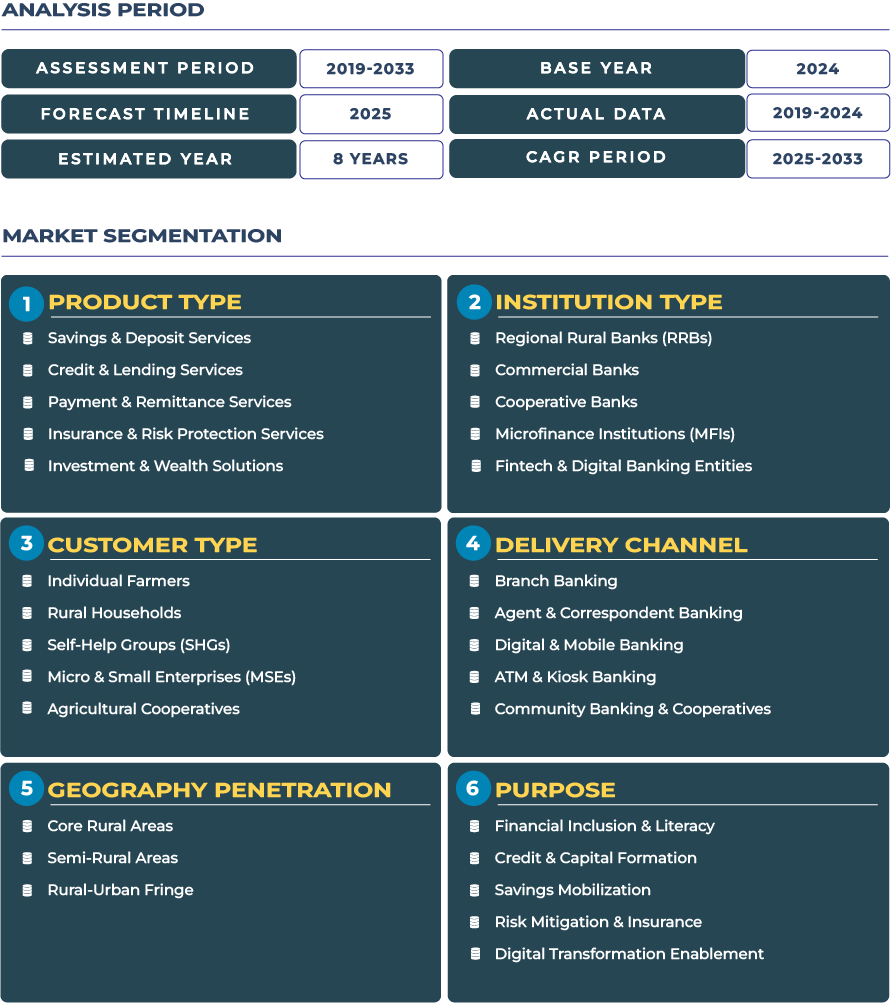Benelux Rural Banking Market Outlook: Circular Agriculture and Logistics-Linked Lending Power a New Rural Finance Era
The Benelux region, comprising Belgium, the Netherlands, and Luxembourg, is redefining its rural banking market by aligning finance with circular agriculture and logistics-linked lending. In 2025, the Benelux rural banking Market is valued at USD 5.9 billion and is expected to reach USD 7.9 billion by 2033, reflecting a CAGR of 3.6% from 2025 to 2033, according to DataCube Research. The market’s steady performance stems from its commitment to sustainability-driven credit models, high SME digital adoption, and the growing role of cooperative export hubs that connect farms to Europe’s largest logistics corridors.
Note:* The market size refers to the total fees/revenue generated by banks through various services.
Across the Benelux economies, rural banking institutions are channeling finance into circular agri-business models, such as nutrient recycling, manure-to-energy conversions, and water-efficient irrigation systems. By integrating financial innovation with green transition goals, banks are not merely funding rural enterprises but transforming them into sustainable profit centers. The market’s structural resilience, supported by strong policy frameworks from organizations such as European Commission’s Directorate-General for Agriculture and Rural Development, is enabling a new wave of financial inclusivity for farmers, cooperatives, and rural SMEs.
Benelux Rural Banking Market Outlook: Circular Agriculture and Agri-Logistics Lending Define Rural Finance Future
In the Benelux rural banking ecosystem, the shift toward circular agriculture is the cornerstone of future financial growth. The focus on “waste-to-wealth” and integrated logistics has catalyzed demand for specialized credit, leasing, and insurance products. With the region’s compact geography and advanced transport networks, rural banks are leveraging agri-logistics linkages to fund cooperatives that export dairy, meat, and horticultural products through major hubs like Rotterdam and Antwerp. The interplay of sustainability, connectivity, and export financing underscores a strong long-term outlook for the sector.
Political stability across the Benelux region, coupled with fiscal prudence and robust environmental policies, has helped rural banks maintain a disciplined approach to credit and risk protection services. The presence of digital-first cooperatives and local sustainability mandates by agencies such as RVO Netherlands Enterprise Agency have also bolstered access to innovation finance. However, the region’s banks are not immune to external challenges such as the energy transition’s cost pressures and shifting European Union agricultural subsidies. Despite these factors, the market’s alignment with the EU Green Deal and rural modernization schemes reinforces its growth stability through 2033.
Drivers & Restraints: Digital Inclusion and Export Hubs Fuel Expansion, While Scale Constraints Persist
High Rural SME Digitalization and Logistics Corridors Drive Market Expansion
Benelux rural banking sector benefits from a high degree of SME digitization in agriculture and logistics. Digital payment and lending solutions have reduced operational friction for rural entrepreneurs, especially in regions like Flanders and Friesland where cooperative farming is embedded in community economics. The availability of agri-export infrastructure, ports, cold chains, and cross-border transport networks, has expanded the scope for export credit and working capital financing. Moreover, the proliferation of fintech partnerships between traditional banks and tech-driven platforms is reshaping how rural credit and remittance services are delivered, enhancing transparency and efficiency across the rural banking landscape.
Small Market Scale and Competitive Digital Banks Restrict Expansion Potential
Despite its dynamism, the Benelux rural banking industry faces structural constraints due to limited geographic scale and the growing presence of purely digital neobanks. Smaller rural lending portfolios often lead to higher per-unit administrative costs, curbing profitability for traditional cooperatives. Moreover, heightened competition from digital-first lenders, many of which offer faster approval cycles and lower service costs, puts pressure on established players like Rabobank and KBC to innovate faster. The challenge lies in balancing personalized service with technology adoption while navigating EU regulatory complexities and sustainability reporting obligations.
Trends & Opportunities: Circular Finance and Farm-to-Industry Integration Reshape the Market
Integration of Circular-Economy Lending in Rural Finance Portfolios
One of the most defining trends in the Benelux rural banking sector is the mainstreaming of circular-economy lending. Financial institutions are increasingly financing agricultural projects that transform waste streams into energy, fertilizer, or reusable materials. For instance, Dutch rural banks are piloting manure-to-energy credit schemes in the dairy sector, providing capital under performance-based repayment models. Similarly, banks in Belgium are offering sustainability-linked loans for farmers adopting low-emission technologies. These instruments not only reduce environmental impact but also unlock new asset classes within rural lending portfolios, creating measurable value for investors and farmers alike.
Expanding Opportunities in Equipment Leasing and Contract-Farming Finance
Emerging opportunities center around contract-farming receivable discounting and circular equipment leasing. A May 2025 joint venture between a Dutch fintech and a Belgian cooperative bank launched circular leasing for manure-to-energy projects in Flanders and the Netherlands, reducing farmers’ upfront CAPEX. Additionally, a Luxembourg-based small finance bank inaugurated a rural SME digital hub in September 2025 to fund logistics-linked agri-exports, improving credit availability in cross-border farming clusters. These initiatives signify how the rural banking industry is evolving beyond traditional deposit and loan services to adopt more asset-light and innovation-centric financial models.
Competitive Landscape: Cross-Border Partnerships Accelerate Sustainable Finance
The Benelux rural banking ecosystem is characterized by strategic alliances among cooperatives, commercial banks, and digital finance startups. Rabobank, KBC Group, and Banque Internationale à Luxembourg (BIL) are the key players expanding their rural portfolios by integrating circular financing and agri-logistics loans. For example, Rabobank’s regional cooperatives are channeling funds into sustainable water management and export-led agribusiness, while KBC’s innovation labs are exploring receivable discounting models for horticultural exporters. The Luxembourg small-finance bank’s 2025 expansion into rural-SME digital hubs further enhances cross-border access to rural lending.
In addition to traditional banks, local credit unions and EU-supported microfinance institutions are playing pivotal roles in promoting inclusivity. The use of export-credit insurance, performance-linked financing, and pay-for-efficiency models is deepening rural resilience and reducing default risks. Overall, the Benelux rural banking market is transitioning from a credit-driven framework to a sustainability-oriented ecosystem, where financial products directly incentivize climate-smart agriculture and efficient trade integration.







